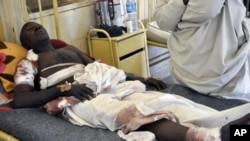Friday's deadly bomb attacks in Nigeria's second largest city, Kano, are the latest in a series of spectacular strikes by the radical Islamist sect Boko Haram. The coordinated series of assaults on police stations and other government offices killed at least 200 people. The rise of Boko Haram is sparking concerns that Africa's most populous country may be edging closer to civil war.
Nigeria's Nobel laureate Wole Soyinka predicted it; political analysts are regularly asked about it; and the Kano attacks prompted the Leadership newspaper to run as its weekend edition headline, “Finally, Boko Haram Launches War.”
The radical Islamist Boko Haram has made headlines with increasing frequency lately for a series of audacious terrorist strikes. Among them, a Christmas Day bomb blast that killed worshippers at a Catholic Church and a deadly suicide bomb last August at a U.N. headquarters in Abuja.
Nigeria's 160 million people are roughly divided between a mostly Muslim north and a predominantly Christian south.
The Christmas Day church attack, and the name Boko Haram, which in the Hausa language spoken in the north means “Western education is sacrilegious,” are seen as signs of the group's Islamic radicalism.
But nearly all experts and scholars interviewed for this report agreed the Boko Haram phenomenon is not mainly fueled by religious extremism. Rights activist and expert on the causes of political violence Damian Ugwu says Boko Haram's support base is mostly unemployed northern youth who see a corruption-riddled government stealing the country's vast oil wealth.
“I see Boko Haram as the end result of manifestation of bad policies and impunity in Nigeria," said Ugwu. "For me it is a society where the wealth of the country is being cornered by the elite who do not care what happens to the rest of the country. You are bound to see a lot of people who are angry with the system.”
President Goodluck Jonathan's government has portrayed Boko Haram as a Muslim fundamentalist group bent on establishing an Islamist state in the north. They have appealed to the international community for financial assistance in fighting terrorism.
Former U.S. ambassador to Nigeria John Campbell, now with the New York-based Council on Foreign Relations, says there is undoubtedly a criminal element within the Islamist group. But in a telephone interview, Campbell said the government's counter-terrorism strategy could backfire.
“What the Nigerian government is doing is treating Boko Haram as a security problem," he said. "I see it more as a political problem, and rather than focusing so much on police methods, I would try political initiatives that might have the potential for sucking the oxygen out of Boko Haram.”
Campbell suspects the number of hard-core Boko Haram operatives is small. It is likely to have been made smaller by losses suffered in the Kano attacks.
Among politicians in Nigeria's north, the concept of Boko Haram as radical Islamists seems peculiar. National Secretary of the opposition Congress for Progressive Change, Buba Galadima, says what is really a group engaged in class warfare is being portrayed in government propaganda as terrorists in order to win counter-terrorism assistance from the West.
“It is a class war born out of poverty," Galadima. "They are attacking their oppressors. I want you to buy this rather than those propaganda that government is churning out because they want Western support, because it is what the West will not want to hear. Jihad.”
Galadima denies any connection with Boko Haram, but he argues that the name “Western education is sacrilegious” is widely misunderstood. He says it is really a rallying cry against Nigeria's corrupt Western-educated elite.
"What the Boko Haram people are saying is it is sacrilegious to acquire Western education and use it to cheat, shortchange your fellow human being," he said. "If that is all Western education is about, for you to get into a position of authority and steal from the public treasury, then it is bad."
Galadima and others accept that Boko Haram is both radical and Islamist. It has also used terrorist tactics against Christians. But they point out that in the Kano attacks, the targets were police officers, who in a predominantly Muslim city are likely to be mostly Muslims.
They also note that a week earlier, the story from Kano was about Muslims and Christians protecting each other as they conducted prayers during the national strike against gasoline price increases.
Nigeria has a long and proud history of religious tolerance.
So while Nigerians worry about the potential for civil war and disintegration, the fault lines of greatest concern are more economic than sectarian. Poverty, and the disgust with a government perceived as corrupt and inefficient, transcend religious differences.
Boko Haram's Rise in Nigeria Sparks Civil War Fears




